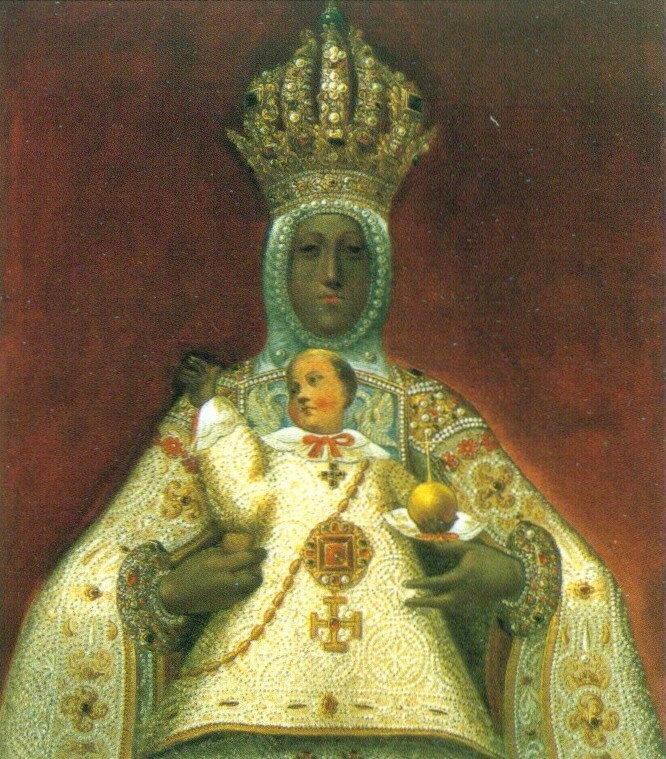The Black Madonna / Ensemble Unicorn
Pilgrim Songs from the Monastery of Montserrat

medieval.org
Naxos 8.554256
1998
1. Cuncti simus concanentes [6:40]
a ball redon, Llibre Vermell de Montserrat, Monasterio de Santa Maria
LV 6
2. Quant voi la flor novele [4:02]
chanson pieuse, anon. trouvère — Paris, Bibl. Nat., nouv. acq. f. fr. 1050
3. A Madre do que a bestia [7:12]
Cantiga de Santa Maria, No. 147 — El Escorial
Ms. T.I.1 and Ms. j.b.2
CSM 147
4. Amours, ou trop tart me sui pris [4:41]
chanson mariale, La Roïne Blance —
Paris, Bibl. Nat., nouv. acq. f. fr. 21677
5. Quant ay lo mon consirat [6:10]
chanson pieuse, anon. troubadour — Madrid, Bibl. Nac. 105
6. Mariam, Matrem virginem [6:12]
Llibre Vermell de Montserrat, Monasterio de Santa Maria
LV 8
7. O Virgo splendens [5:38]
Llibre Vermell de Montserrat, Monasterio de Santa Maria
LV 1
8. Tanto son da groriosa [5:56]
Cantiga de Santa Maria, No. 48 — El Escorial
Ms. T.I.1 and Ms. j.b.2
CSM 48
9. Commencerai a faire un lai [5:32]
strophes de lai marial, THIBAUT de CHAMPAGNE —
Paris, Bibl. Nat., f. fr. 844
10. Cantigas de Santa Maria 77/119 [2:22]
Cantiga de Santa Maria, No. 77/119 — El Escorial
Ms. T.I.1 and Ms. j.b.2
CSM 77 ·
CSM 119
11. O Maria, maris stella [3:17]
Hu 104
Codex Las Huelgas, Burgos, BUlh, fol. 102v
12. Los set gotx [7:19]
a ball redon, Llibre Vermell de Montserrat, Monasterio de Santa Maria
LV 5
Ballada del goytxs de Nostre Dona en vulga cathallan
Deutscher Text •
English Text •
Texte en français
Ensemble Unicorn
Under its director Michael Posch, the Ensemble
Unicorn sees its task as making the wide range of music from the Middle
Ages and Early Renaissance more accessible to a wide audience through
refreshingly new interpretations, with lively authenticity its guiding
principle. The core ensemble consists of specialist musicians from
Austria, Italy and Germany, and well-known singers and instrumentalists
may be called on as guest performers, as occasion requires. Intensive
research and study of early music as well as experience gained by
collaboration with interntational ensembles such as the Clemencic
Consort are complemented by the interest of individual members of the
Ensemble in various kinds of music, including jazz. The Ensemble has
made several recordings on compact disc and appeared on radio and
television, and has for many years been involved in education and
cultural projects with the Austrian Federal Ministry for Education and
the Arts. The Ensemble has made numerous festival appearances and
concert tours throughout Europe in North America, and the Near East.
Belinda Sykes — voice (1, 3, 5, 9, 12)
Bernhard Landauer — countertenor (1, 2, 4, 6, 8, 11)
Choir:
Agnes Boll, Susanne Kurz, Ulrike Wedening — sopranos (1, 3, 4, 6-8, 12)
James Curry — tenor (1, 4, 8, 12)
Raimund Natiesta — bass (1, 4, 8, 12)
Marco Ambrosini — Fiddle (1, 3, 5-8, 10-12)
Thomas Wimmer — Fiddle, laud, rebec (1, 3, 5-12)
Riccardo Delfino — Gothic harp, snareharp (1-3, 5-12)
Katharina Dustmann — Riqq, zarb, davul, darabukka, bandir (1, 3-5, 7, 8, 12)
Wolfgang Reithofer — Darabukka, Schellentamburin (4, 10)
Michael Posch — Recorders (1, 3-8, 10-12)
Instruments
Fiddles - Helmut Gotschy, Germany; Thomas Wimmer, Austria
Rebec - Dieter Möckel, Germany
Laud - Anon., Istanbul, Turkey
Gothic harp, snareharp - Rainer Thurau, Germany
Riqq, bandir - S. Saha Sağbaş, Ankara, Turkey
Zarb - Anon., Teheran, Iran
Davul, darabukka - Anon., Morocco/Turkey
Recorders - Monika Musch, Germany; Walter Meili, Switzerland
Michael Posch
The
recorder-player Michael Posch was born in Klagenfurt, Austria, and
studied at the Carinthian Academy, at the Vienna Hochschule für Musik
und darstellende Kunst and at the Trossingen Musikhochschule. Solo
appearances with conductors such as Nikolaus Harnoncourt and
collaborations with early music ensembles such as Accentus, Oni Wytars,
the Clemencic Consort and Concentus Musicus bear witness to his enormous
musical activity, in addition to his academic work in the fields of
recorder-playing and early music. He is currently director of the Early
Music Departments of the Vienna Conservatory.
Belinda Sykes
Belinda
Sykes studied singing with Bulgarian folk singers, and has collected
songs from Bulgaria, Spain, Morocco, Hungary, Israel and India, and now
works throughout Europe as a freelance medieval singer. She initially
studied oboe and recorder at the Guildhall School of Music in London,
winning the 1990 Reichenberg Award for baroque oboe. She has appeared
with a wide range of ensembles, including the New London Consort, King's
Consort and BBC Symphony Orchestra, and directs her own ensemble
Joglaresa. She teaches at the Guildhall School of Music, Exeter
University and the Welsh College of Music.
Bernhard Landauer
Bernhard
Landauer was born in Innsbruck and was a member of the Wilten Boys'
Choir, before study at the Mozarteum in Innsbruck and at the Vienna
Academy of Music, where his teachers included Helene Karusso and Kurt
Equiluz. His main musical interest lies in the performance of early
music, and he has worked with many renowned ensembles and conductors,
including René Clemencic, René Jacobs, Cantus Cölln, the Freiberg
Baroque Orchestra, King's Consort and Ensemble Clément Janequin as well
as the Viennese early music ensembles Unicorn and Accentus, with
numerous appearances at festivals throughout Europe. He has sung the
rôle of Oberon in Britten's Midsummer Night's Dream in Leipzig and Wuppertal, and took part in the first performance of Schnittke's Gesualdo at the Vienna State Opera.
Pilgrim Songs from Montserrat
Recorded at W.A.R. Studio, from 17th to 21st May, 1996
Producer: Michael Posch
Engineers: Elisabeth and Wolfgang Reithofer
Music Notes: Michael Posch and Agnes Boll
Cover Painting: The Virgin of the Sanctuary by a seventeenth-century Spanish Master (AKG, Berlin)
Visit the Naxos Internet site: http://www.hnh.com
℗ © 1998 HNH International Ltd.


